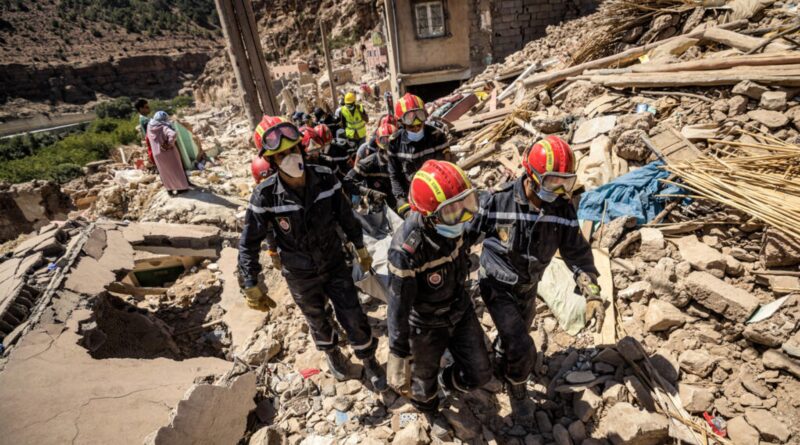Rescue teams dig for quake survivors, bodies in Morocco mountain villages
Rescue teams stepped up on Wednesday a massive effort in devastated Moroccan mountain villages as chances faded for finding survivors from last week’s earthquake which killed nearly 3,000 people and left many homeless.
Issued on:
3 min
Vehicles packed with supplies were inching up winding mountain roads to deliver desperately needed food and tents to survivors of the nation’s strongest quake on record and deadliest in more than six decades.
Smaller quakes are still rattling the disaster zone and one sent stones falling in the village of Imi N’Tala, where a person was injured following the jolt, AFP journalists saw.
Search teams were still scouring the rubble for the living. Morocco is now well past the 72-hour window when rescues are considered most likely, yet survivors are in some cases found well beyond that period.
“We’re working in a lot of places,” said Fahas Abdullah Al Dosanri of the Qatari fire department, part of the international aid effort, adding some villages still cannot be reached by road.
Moroccan authorities reported that crews were working to clear unpaved tracks that have been cut off by landslides.
In the hardest-hit areas south of Marrakesh many villages in the High Atlas mountains were completely destroyed and locals were taking shelter in yellow government-issued tents.
“We just have the food donations, and we have some blankets, but no housing,” said 18-yead-old survivor Afrah Fouzia in the tiny mountain village of Tikht, which was so heavily damaged that it is now only rubble.
“Soon the rainy season will start, it will get colder and we’ll be completely destitute,” she told AFP. “There are a lot of children here.”
The tents in Tikht and elsewhere are an indication that aid is reaching some remote places but they are intended to be only temporary and will be totally insufficient once the weather turns.
Hard-hit mountain villages
Morocco is deep in mourning, with an updated toll issued late Wednesday recording at least 2,946 dead and 5,674 injured in the 6.8-magnitude quake that struck late Friday.
Helicopters are being used to evacuate the injured from remote places or those that cannot be reached by road, with media reports saying at least three people were airlifted to Marrakesh on Wednesday.
The toll is unlikely to be the final one, as crews are recovering bodies during their work, including one pulled from a collapsed home in the mountain village of Talat N’Yaqoub.
In the tourist hub of Marrakesh, whose UNESCO-listed historic centre suffered cracks and other damage, many families still slept out in the open for a fifth night, huddled in blankets on public squares for fear of aftershocks.
But the need was most desperate in remote and poor mountain villages, where traditional adobe homes crumbled to rubble and dust.
Many Moroccan citizens have rushed to help quake victims with food, water, blankets and other aid or by donating blood to help treat the injured, an effort joined by the national football team.
“We’re not an association, we’re volunteers, civilians,” noted Mariam El Bakrem, a 38-year-old Moroccan who said they chartered about 40 trucks full of food and clothing.
“We launched an initiative on Facebook and… within half an hour, donations started pouring in,” she said.
Nearly 20 volunteers were handing out the donations at an improvised distribution point in Adassil, another hard-hit village.
The challenge of rebuilding
Morocco has allowed rescue teams to come to its aid from Spain, Britain, Qatar and the United Arab Emirates but so far declined offers from several other nations, including the United States, France and some Middle Eastern countries.
The United States on Wednesday offered $1 million in support of groups on the ground and said it had deployed a small team to Morocco to help assess the situation.
“We are in discussions with them about what we can best provide to support their efforts,” said State Department spokesman Mathew Miller.
The quake was Morocco’s deadliest since a 1960 earthquake destroyed Agadir on the Atlantic coast, killing between 12,000 and 15,000 people.
The United Nations estimated that more than 300,000 people have been affected by the latest earthquake, one third of them children.
The rebuilding effort is expected to be enormous for the North African country which was already suffering economic woes and years of drought and now fears a downturn in the crucial tourism sector.
The disaster has left a vast number of homes uninhabitable in rural areas where locals don’t have the money to quickly, or maybe even ever, rebuild without help.
“We lost everything,” said Mohammed Al Moutawak, a 56-year-old farmer in the village of Ineghede.
(AFP)

